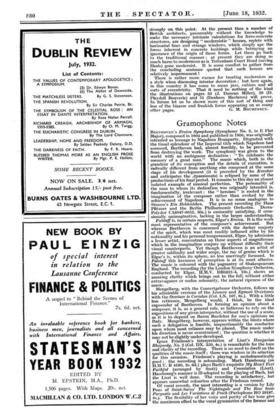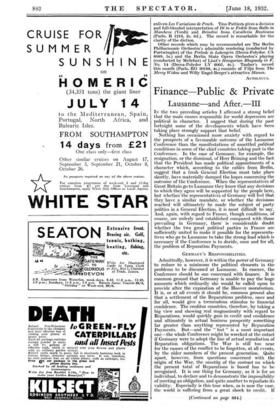Gramophone Notes
BEETHOVEN'S Eroica Symphony (Symphony No. 3, in E Flat Major), composed in 1804 and published in 1806, was originally intended as homage to Napoleon Bonaparte. Disgusted with the tinsel splendour of the Imperial title which Napoleon had assumed, Beethoven had, almost forcibly, to be prevented from destroying the work. The symphony was given to the world with an ambiguous dedication : To celebrate the memory of a great man." The music which, both in the grandeur of its conception and the details of execution, is radically different from anything else composed at the same stage of his development (it is preceded by the Kreutzer and anticipates the Apassionata) is eclipsed by none of the productions of his final period. It remains to this day an almost isolated example of musical perfection. The personality of the man to whom its dedication was originally intended is, fundamentally, irrelevant : the " heroism " is rooted in the imagination of the composer rather than evoked by the achievement of Napoleon. It is in no' sense analogous to Strauss's Bin Heldenleben. The present recording (by Hans Pfitzner and the Berlin Philharmonic Orchestra. Decca- Polydor CA8047-8052, 80s.) is eminently satisfying, if occa- sionally unimaginative, lacking in the larger understanding. Falstaff is, in certain respects, Elgar's Eroica. It is the work most representative of the composer's achievement. But whereas Beethoven is concerned with the darker majesty of the spirit, which was most readily inflamed alike by his nationality and his personal temperament, Elgar, by admission a lesser artist, concentrates on those aspects of magnificence which in the 'imagination conjure up without difficulty their visual counterparts. Yet though Beethoven is an artist of greater sublimity and wider scope, the ray of genius which is Elgar's is, within its sphere, no less unerringly focussed. In Falstaff this keenness of perception is at its most allusive. The music is coloured with the pageantry of Shakespearean England. The recording (by the London Symphony Orchestra, conducted by Elgar, H.M.V. DB1621-4, 24s.) shows an amazing clarity which brings out to the full, without either extravagance or undue solemnity, the natural ripeness of the music. .
Mengelberg, with the Concertgebouw Orchestra, follows up his admirable versions of the Leonore and Egmont Overtures with the Overture to Coriolan (Col. LX. 167, 6s.). With a little less reticence, Mengelberg would, I think, be the ideal expounder of Beethoven. In forming an opinion about a composer, it is, as a general rule, as ludicrous to rely on the expositions of any given interpreter, without the use of a score, as it is to depend on Baron Baedeker for one's opinions on Italy. Mengelberg, however, appears within the limits where such a delegation is feasible, unquestionably the conductor upon whom most reliance may be placed. The music under his direction is never overstrained ; the question is whether it may not be slightly under-developed.
Ignaz Friedman's interpretation of Liszt's Hungarian Rhapsody, No. 2 (Col. DX. 3.50, 4s.) is remarkable for the tone and clarity of the recording. There is no need to dwell on the qualities of the music itself ; there was wisdom in its selection
for this occasion. Friedman's playing is melodramatically
good ; the recording is astounding. Mark Hambourg (on H.M.V. 13 4180, 2s. 6d.) plays Bach's exquisite My Heart Ever Faithful (arranged by Scott) and Consolation (Liszt). Hambang's manner is ill-adopted to the playing of Bach, but the Liszt is well done. The recording is satisfactory, but appears somewhat colourless after the Friedman record.
Of vocal records, the most interesting is a version by Lily Pons of Saint-Satins' The Nightingale and The Rose from
Parysatis and Les Variations de Proch (Parlophone RO 29187, 4s.). The flexibility of her voice and purity of her tone give the maximum effect to the vocal gymnastics of the former and enliven Les Variations de Prot*. Tine Pattiera gives a decisive and full-blooded interpretation of Di to se Fedele from Ballo in Maschera (Verdi) and Brindisi from Cavalleria Rusticana (Patio. R 1216, 2s. 6d.). The record is remarkable for the clarity of the diction.
Other records which may be recommended are The Berlin Philharmonic Orchestra's admirable rendering (conducted by Furtwiingler) of the Prelude to Lohengrin (Decca-Polydor. CA 8089, 5s.) and the Berlin State Opera Orchestra's playing (conducted by Melichar) of Liszt's Hungarian Rhapsody in F,
No. 14 (Decca-Polydor 6005, 4s.). Tauber's record this month (Parlo. RO 20188, 4s.) consists of Vilja from The Merry Widow and Willy Engel-Berger's attractive Marion.
Atrrotveus.









































 Previous page
Previous page